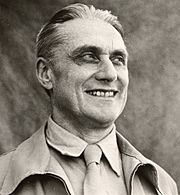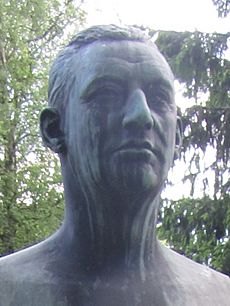Ragnar Frisch facts for kids
Quick facts for kids
Ragnar Frisch
|
|
|---|---|

Ragnar Frisch, c. before 1944
|
|
| Born |
Ragnar Anton Kittil Frisch
3 March 1895 |
| Died | 31 January 1973 (aged 77) |
| Nationality | Norwegian |
| Alma mater | University of Oslo |
| Known for | Econometrics Production theory |
| Awards | Nobel Memorial Prize in Economic Sciences (1969) |
| Scientific career | |
| Fields | Economics |
| Institutions | University of Oslo |
| Doctoral students | Olav Reiersøl Trygve Haavelmo |
Ragnar Anton Kittil Frisch (born March 3, 1895 – died January 31, 1973) was an important Norwegian economist. He helped make economics a science that uses numbers and statistics.
In 1926, he created the word "econometrics". This means using statistics to study how economies work. In 1933, he also came up with the terms "microeconomics" and "macroeconomics". Microeconomics looks at small parts of the economy, like individual businesses. Macroeconomics looks at the economy as a whole.
Ragnar Frisch was the first to create a statistical model for "business cycles". These are the ups and downs of an economy. Later, he shared the first Nobel Memorial Prize in Economic Sciences in 1969 with Jan Tinbergen for their work.
Frisch earned his PhD in mathematics and statistics from the University of Oslo in 1926. After that, he spent five years doing research in the United States. He taught briefly at Yale University. He then became a professor at the University of Oslo in 1931. In 1932, he became the leader of the new Institute of Economics there. He stayed at the University of Oslo until he retired in 1965.
Frisch also helped start the Econometric Society in 1930. He was the editor of its journal, Econometrica, for 21 years. The Frisch Medal is named after him. It is given every year for the best paper in econometrics.
Contents
Early Life and Education
Family Background
Ragnar Frisch was born on March 3, 1895, in Christiania (now Oslo), Norway. His father, Anton Frisch, was a gold- and silversmith. His mother was Ragna Fredrikke Frisch.
The Frisch family came from Germany to Norway in the 17th century. For many generations, his family worked with silver at the Kongsberg Silver Mines. Ragnar's grandfather became a goldsmith in Christiania in 1856. So, his family had worked with precious metals for at least 300 years.
Becoming an Economist
Ragnar was expected to continue the family business. He became an apprentice at a workshop in Oslo. But his mother told him to also study at the University of Oslo.
He chose to study economics because it seemed like a quick and easy subject. He finished his degree in 1919. In 1920, he also passed his craftsman tests. He then became a partner in his father's workshop.
In 1921, Frisch received a scholarship from the university. This allowed him to study economics and mathematics in France and England for three years. When he returned to Norway in 1923, his family's business was having problems. But he believed his true calling was research, not jewelry.
He published some papers about probability theory. In 1925, he started teaching at the University of Oslo. In 1926, he earned his PhD with a paper on mathematical statistics.
Career and Contributions
New Ideas in Economics
In 1926, Frisch wrote an article saying that economics should use numbers and data. He thought it should be like other sciences, especially physics. In the same year, he published an important article called "Sur un problème d'économie pure." This paper started to put his ideas into practice.
He also began teaching a course on production theory. This course used mathematics to explain how goods are made.
In 1927, Frisch received a scholarship to visit the United States. He wanted to meet other economists who were interested in using math and statistics. He met famous economists like Irving Fisher. He wrote a paper about how investment affects economic fluctuations (changes in the economy).
Later Career Highlights
Frisch had to return to Norway in 1928 because his father passed away. He spent a year modernizing his family's workshop. He then found someone to manage the business for him.
In 1928, he became an Associate Professor of statistics and economics at the University of Oslo. He published several articles on time series statistics. In 1929, he wrote an important essay on how to use econometrics.
Frisch became a full Professor at the university in 1931. In 1932, he founded the Institute of Economics at the university. He became its Director of Research.
In 1961, Ragnar Frisch received the Antonio Feltrinelli prize. In 1969, he won the Nobel Memorial Prize in Economic Sciences. He shared this prize with Jan Tinbergen. They won for developing and using models to study economic processes. He was also a member of important academic groups.
During World War II, when Nazi Germany occupied Norway, Frisch was imprisoned. He was held in different concentration camps from 1943 to 1944.
Family Life
Frisch married Marie Smedal in 1920. They had a daughter named Ragna, born in 1938. His granddaughter, Nadia Hasnaoui, became a famous Norwegian television presenter. After his first wife died in 1952, he married Astrid Johannessen in 1953. She was a childhood friend.
His Work and Legacy
Ragnar Frisch was a founder of economics as a modern science. He made many important advances in the field. He also created new words like "econometrics" and "macroeconomics". His 1926 paper on how consumers make choices helped shape modern economic ideas. He also made production theory more formal, especially about shared resources.
In econometrics, he worked on time series (data over time) and linear regression analysis. He also helped introduce the idea of an "economic model."
His 1933 work on "impulse-propagation business cycles" became a key idea in understanding how economies change. He also helped use econometric models for government economic planning.
He was one of the people who started the Econometric Society. He was also the editor of the journal Econometrica for over twenty years. The Frisch Medal is given every two years for the best paper published in Econometrica.
Ragnar Frisch's main hobby was bee-keeping. He even did genetic studies on bees!
See also
 In Spanish: Ragnar Frisch para niños
In Spanish: Ragnar Frisch para niños
 | James B. Knighten |
 | Azellia White |
 | Willa Brown |


